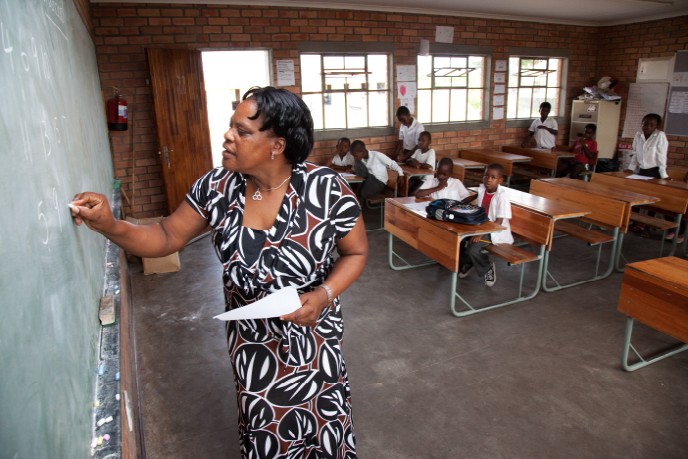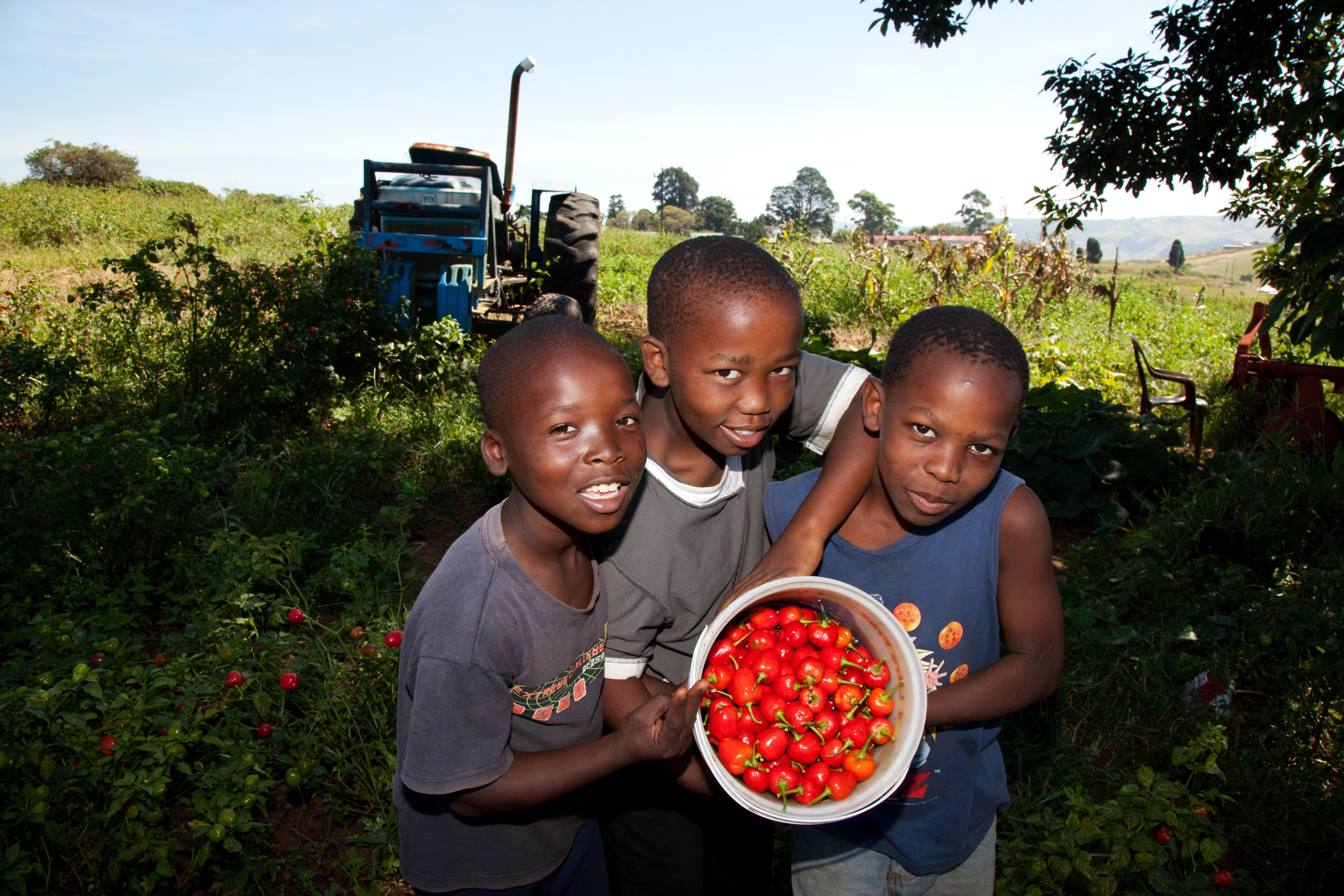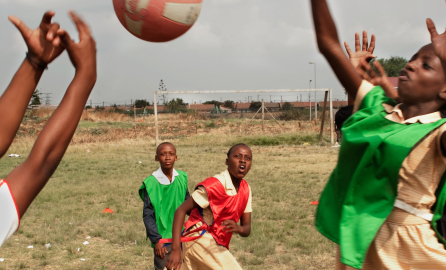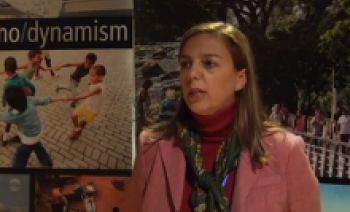Despite important investments, educational outcomes in South Africa still have a long way to go. From programmes targeting early-childhood development to life-skill workshops, we discussed EU involvement in the country with Arno Schaefer, Head of Cooperation at the EU Delegation.
"When we talk about South Africa, we often hear the term ‘youth dividend’,” said Arno Schaefer, Head of Cooperation at the EU Delegation to the country. “A young and growing population is taken to mean that the future will be bright. However, this also means there are enormous challenges.”
Among the biggest challenges faced by South Africa is the endemic problem of inequality. “South Africa hasn’t been able to balance out living conditions since the end of Apartheid,” Schaefer said. “Inequality is still very strong along racial lines, which of course creates a larger risk for social tensions than inequality normally does.”
The system of townships, established under Apartheid, for one, still exists today. “Being born to poor parents in a township or to rich ones in a wealthier neighbourhood – this really changes your chances in life,” Schaefer said.

A teacher and her class.
In addition to inequalities rooted in historical divisions, social service infrastructure has failed to keep up with the country’s growth. “While 20% of the population live at European standards, close to 60% live in the same conditions as those in least-developed countries,” Schaefer said. “It’s not a very sustainable situation.”
The problems are clear, and tackling inequality, poverty and unemployment forms a standard reference in common declarations and policy orientation between the EU and the South African government. The EU Delegation’s programming aims to address three areas of cooperation: employment creation, education and governance.
The youth dividend isn’t forgotten in these priorities, Schaefer added, from tackling high rates of youth unemployment (youth in South Africa are defined as those between 14 – 35 years of age) to ensuring that the country’s institutions provide a strong framework to hold it all together.
Tackling the educational gap
The South African government invests a lot of money in education – rivalling some European states – but this hasn’t been reflected in education outcomes. Standardised test results, for example, continue to be sub-par for many school-aged South Africans when compared to their peers in other African countries.
A large percentage of the aid provided by the EU comes in the form of budget support, done at a country-wide level. This is complemented by technical cooperation with the government and ad-hoc interventions through local civil society organisations.
Education for Employability, to be one of the Delegation’s flagship programmes, will be rolled out over the coming year. The programme covers more than just the classroom. “It will start already before early childhood development,” Schaefer said. “When children are stunted and don’t have adequate nutrition in the early years, they are often disadvantaged for the rest of their life.”
“When these young people are given an opportunity to do something else, we often see a lot of enthusiasm to grasp it, use it and keep on going”
Having accompanied a child through their formal education, the approach will end with professional skill building and the placement of students in the workforce. “We know from the statistics that those who have some exposure to professional life have a better chance later on of finding sustainable employment,” Schaefer said.
Building life skills
The focus on life skills – and the important interplay they have with formal education – is present in several of the smaller projects the EU Delegation is involved in. “The children may know mathematics and English, but if their life skills are very poor, they will still have a difficult time in school,” said Schaefer.

The interplay of life skills with formal education helps children in the classroom and throughout their lives.
Among the Delegation’s projects is the Soul Buddyz Clubs, an NGO that focuses on developing stronger interpersonal skills, such as teamwork and dealing with bullying.
The country’s inequalities play out here, too. “The townships often have an environment of gangs, criminality and drugs; it is often quite difficult to get children out of this,” Schaefer said.
Providing the right role model for children can help. Many of youth in poor townships come from disrupted family situations, Schaefer explained, so guaranteeing a degree of stability, in addition to technical competences, is one way of achieving success.
“When these young people are given an opportunity to do something else, we often see a lot of enthusiasm to grasp it, use it and keep on going.”
Training for a better future
EU-backed skill trainings form a way of building a bridge for youth from the educational system to decent employment. Many of these projects focus on the most vulnerable youth from destitute areas.
“There’s a clear gap between what the labour market requires and what young people have to offer,” Schaefer said. “There is a high demand for high skilled labour, but very little for unskilled, resulting in huge wage differences and thus, inequality. Unfortunately, a large part of the population is unskilled. With these projects, we try to relax a bit this mismatch.”
“There’s a clear gap between what the labour market requires and what young people have to offer... With these projects, we try to relax a bit this mismatch ”
One of the successes is the support the Delegation has provided to the South African College of Tourism through financial contributions and assistance in infrastructure development. The college accepts boys and girls from dire situations and trains them in the hospitality sector. “The training is relatively high quality, and basically every one of these children gets a job later on and is able to keep it,” Schaefer said.
The Delegation is further beginning the implementation of a substantial programme to support small and medium sized enterprises to assist in employment creation for youth. “Everybody knows that the SMEs have the largest potential for employment creation, but it needs to be tapped,” said Schaefer.
The EU Delegation’s third area of cooperation – governance – has been at the heart of much of EU-South African cooperation since the end of Apartheid. A large part of this has focused on strengthening the institutions of the country: the parliament, the so-called chapter 9 institutions, and the legal system, among others.
“Education systems and training schemes cannot work without a functioning state, so our priority and agreement with the South African government is to create the right environment for jobs and employment opportunities, and the right education and skills for these jobs,” Schaefer said. “This will decide the country’s future prosperity.”
Watch Arno Schaefer discuss the challenges faced by youth in South Africa
This article was written by Craig Hill, Journalist and Content Editor at Capacity4dev.






Log in with your EU Login account to post or comment on the platform.